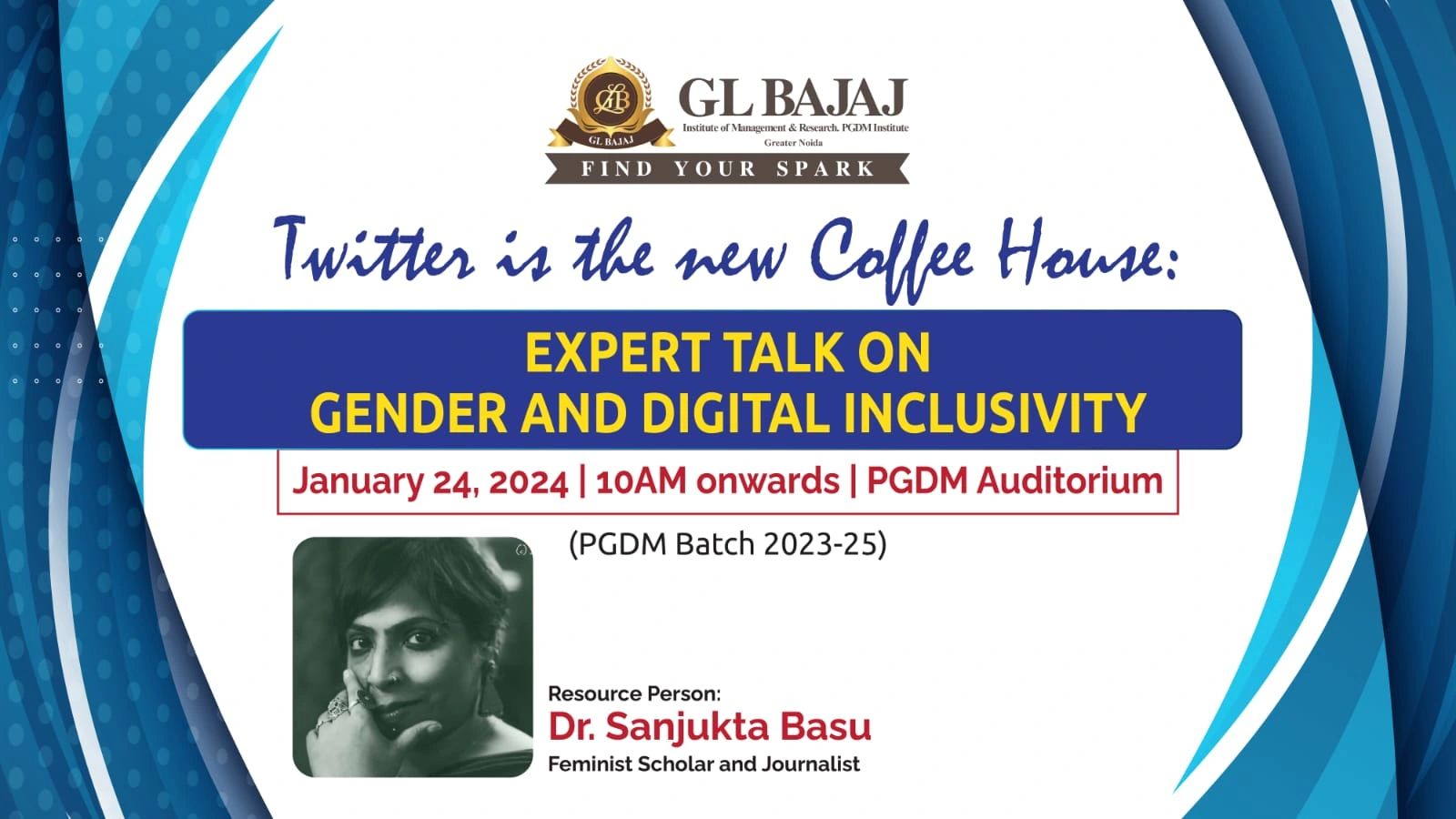Women News founder-Editor Dr Sanjukta Basu recently delivered an Expert Talk Series Lecture titled, Twitter is the New Coffee Hosue: Women’s Political and Existential Space and Digital Inclusivity” at the GL Bajaj Institute of Management and Research.
The talk focused on the importance of women’s safe access to the public sphere and digital public sphere i.e., internet and sites like Twitter/X which facilitates political and existential consciousness-raising. “Women’s political participation does not only mean taking part in elections or joining political parties. It also means being a part of the entire public realm, the entire space outside the privateness of any part of life. Digital inclusivity does not only mean using mobile apps or signing up on some govt web portal to get some benefit of some scheme. It includes access to Twitter and other social spaces free of trolling and harassment. These spaces are like the 17th century Coffee Houses,” said Dr Basu.







“Internet came with a great new promise of democratizing the public sphere and it did for the first decade or so. Women used the space to express themselves in new innovative ways and found transformative powers through internet. But within a decade, the space have become hostile due to issue of trolling and other types of harassment,” Basu said.
Basu explained the concept of “public sphere” adhering to the theory of German political thinker Jurgen Habermas. Habermas called the 17th century coffee houses in London and Salons in Paris as the first public spaces where the authority of Church and Monarch were challenged. These were free spaces, anybody could enter and have rational conversations on things that people of that time thought were important for all public. This is how the idea of “public opinion” or “public criticism” emerged followed by the enlightenment that the King / Govt should be able to rule upon a public only as per the public’s opinion. This ultimately led to the concepts of modern electoral and constitutional democracies, media as the 4th pillar of democracy, free speech, individual liberties and so on.
The public sphere was also the first space where early feminist thoughts emerged. Women of that time did not physically entered the coffee shops in London but they used the “public sphere” of newspapers, journals, letters. Such as Mary Wollstonecraft who wrote the book A Vindication of Women’s Rights in 1992. It is known as the first text on women’s rights and the feminist movement.
Without the public sphere none of the good things we have today would have been possible.
Similarly, internet brought many good things. But, today internet is full of hateful trolls, making uncouth vile abusive statements and this happens the most on Twitter (now X). X/Twitter is both the most important space on internet for political discourse and also the most hateful. It is a known “dirty place” now, everybody knows there is too much trolling and women would rather not go there at all. This is how trolls are taking way women’s space,” said Dr Basu.
So what is the solution?
“Stop normalizing trolling as a fun and casual behaviour or as ‘free speech,’” says Basu. “There is a difference between abuse and freedom of speech. It is very simple actually. People know it. They know what is abuse and what is not, and they knowingly abuse women because they hate women with strong opinions that runs against the dominant ideologies,” Basu argues based on the findings of her doctoral research on the topic of online gender based violence.
Political and ideological differences are welcome in a democracy but the conversations and debates can remain civil. Calling a woman ugly, stupid, slut, bitch, rakshashi, surpanakha, tadaka, presstitute—words that Basu and many of her research participants have heard hundreds of times—is not civil. It is gender based trolling. Women must have access to Twitter because that’s where the public conversations are happening and being a part of those conversations have the potential for similar awakening and consciousness-raising as it happened in the old coffee houses, Dr Basu argued.
—
The Expert Talk was attended by nearly 100 students mostly MBA classes. They were very engaged with the talk. Though it may seem that women’s space as a concept is not relevant for management students but that is not true. Holistic inter-disciplinary learning is important for students of all discipline.

Leave a Reply